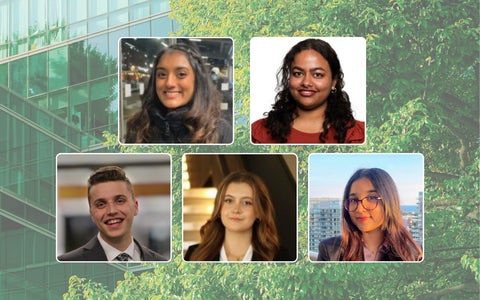
When we first signed up for the A4S International Case Competition, we knew we would have lots of work to do to prepare. As a globally recognized competition, A4S challenges students to build a compelling business case for sustainability around a unique theme. This year's focus was on reimagining the role of finance in accelerating a just climate transition through decarbonization, a challenge we were excited to take on. We researched and prepared for several intense months, and we are proud to share that our team made it to the semi-finals of A4S 2025!
Here’s an inside look at how we prepared for the competition:
Understanding the A4S mission
We began by learning the A4S principles and studying past competition cases to help us get a sense of what a "winning" solution looked like. The winning solutions were not just innovative, more importantly; they were actionable, scalable, and grounded in sustainability best practices.
Team formation & role clarity
From day one, we leaned into our individual strengths. Our team had a blend of finance, strategy, sustainability, and accounting expertise. Clear roles allowed us to stay agile and efficient. Someone always took the lead on an area, while others pitched in to refine. We took this approach across each section.
Research & insight gathering
We dissected the case brief, mapped out the key issues and conducted deep-dive research across sustainability frameworks like Task Force on Climate-related Financial Disclosure (TCFD), Sustainable Development Goals (SDGs) and Sustainability Accounting Standards Board (SASB), stakeholder expectations, industry trends, and innovative financing mechanisms. Every insight we developed had to tie back to long-term value creation.
Solution design
Our goal was simple: propose a solution that balanced financial performance with meaningful environmental and social impact. We cycled through multiple iterations, pressure-tested our assumptions, and refined our model to withstand scrutiny from finance and sustainability professionals alike.
Feedback & refinement
We presented mock pitches to mentors and professors, getting honest feedback that pushed us to level up each time. Their input helped us clarify our messaging, stress-test our logic, and build a more compelling narrative.
Presentation & delivery
A major differentiator at this stage was storytelling. We didn't just present the data, we told a story. Our deck walked judges through the problem, our solution, and the impact it could create in a way that felt clear, confident, and compelling.
Competing alongside bright teams from around the world was inspiring, and we are proud of how far we made it in the competition! Now it's time for reflection and on to the next challenge!